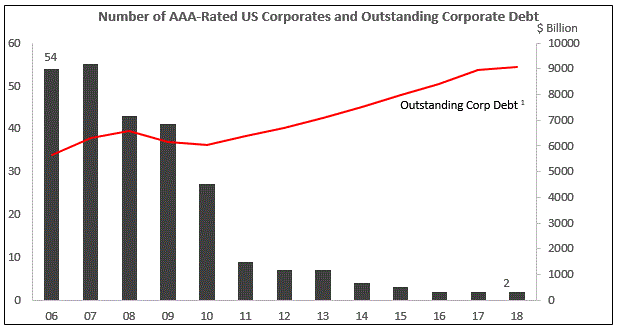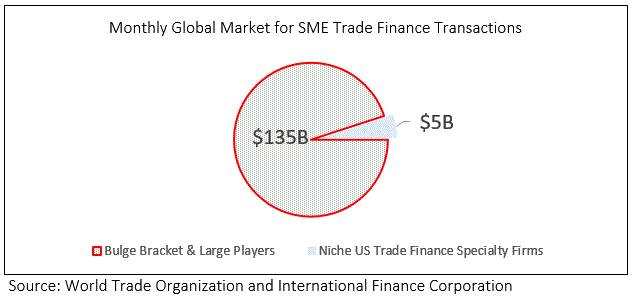TRADE FINANCE:
FIXED INCOME ALTERNATIVE
Uncorrelated Returns · Income Generating · Asset-Backed · Short Duration
WHAT IS TRADE FINANCE? EFFECTIVE WORKING CAPITAL FINANCING SOLUTIONS
Trade finance is financing for manufacturing, processing, distribution, or other commerce related activities on a domestics and international basis. Trade finance is an important external source of working capital financing which can significantly help fast growing and cash constrained businesses.
The scope of trade finance includes factoring (advancing money on invoices), reverse factoring, supplier purchase finance, purchase order finance, and asset/receivable based lending (making loans collateralized by assets/receivables).
The most significant difference between these forms of financing versus general small business lending is that they have short tenors – typically between 30 and 120 days. As result of the short tenor, default rates are historically low.
WHY THE OPPORTUNITY EXISTS
Companies may be motivated to seek trade finance solutions if they are faced with one of the following challenges:
-
Their bank lines are capped
-
They are deemed too small by banks
-
Need financing on an accelerated timeline given growth opportunities
Trade finance provides both an efficient and valuable working capital financing solution to these companies.
IS IT THE RIGHT TIME TO INVEST?
The current market environment is characterized by:
-
Decline in credit quality and rising corporate leverage
-
Elevated valuation across all asset classes with increased uncertainty creates risk to long duration assets

-
Rising interest rate environment increases risk of capital loss in traditional fixed-income
-
Compression of yield across all sectors of fixed income

Solution:
Focus on short duration, collateralized and credit enhanced investments
given elevated risks and heightened complacency
WHY SHOULD AN INVESTOR ALLOCATE TO TRADE FINANCE?
-
High Yield:
-
APR for factoring and supplier purchase financing is usually between 10% and 20%.
-
Credit enhancement through the use of credit insurance on companies that insures up to at least 90% of principal and accrued fees
-
-
Short Tenor and Duration:
-
Investment tenor of 30-120 days with frequent cash flow during tenor of facilities.
-
-
Low Correlation:
-
Self-liquidating and short duration profile of financing results in low correlation to equity and fixed-income markets.
-
-
Low Default Rates:
-
Short tenor and duration results in low default rates during periods of economic contraction.
-
HOW IT WORKS
Supplier Purchase Finance: Supplier purchase finance is an innovative trade structure where the provider acts as a buying agent on behalf of a company by purchasing supplies and then immediately reselling them to their client at an increased price with mutually acceptable terms.
Factoring: Factoring is the process of purchasing invoices from a company at a discount. A client company would enter into this form of financing because they are looking to enhance their cash flow in a timely manner and without raising debt.
SIZE OF THE TRADE FINANCE MARKET:
The World Trade Organization estimates that the trade finance market is $12trillion USD annually, but in order to gain a better scope, it is necessary to narrow the market to small and medium size enterprises. The current global market gap for small and medium-sized enterprise trade finance is estimated to be $140 bn per month. This shortage is caused by the following:
-
Complexity of compliance
-
Labor intensive due diligence process on each deal
-
Up to date IT systems to efficiently process payments

The largest transactions (deal size in billions of USD), generally have low profit margins, and are undertaken by bulge bracket banks and global trading houses with significant capital. However, the majority of trade finance transactions are much smaller (deal size in millions of USD), and are avoided by large firms due to the following extensive due diligence required for each deal:
-
Credit and crime insurance policies between client and financial firm
-
Validity guarantee, personal guarantees from client company shareholders, and oftentimes liens on client inventory to be used as collateral
-
Lock box payment system and continuous servicing of each transaction

RISKS INVOLVED IN INVESTING IN TRADE FINANCE:
-
International Trading Risk: Tariffs and capital controls
-
Mitigant: Managers only enter into international trade transactions when both the client and end debtor have already settled deal terms and are long term trading partners.
-
-
Default Risk: The International Chamber of Commerce estimates that the general default rates for export/import trade finance ranges anywhere from 0.03% to 0.24% with an average time to recovery of 120 days compared to the average of 437 days across all other asset classes.
-
Mitigant: Managers complete comprehensive due diligence on each deal and avoid funding stressed/distressed companies, start-ups/early stage growth.
-
-
Insurance Collection Risk: Many insurance companies have little to no experience collecting in foreign countries.
-
Mitigant: Managers insure each deal through an A rated or higher insurance company that has experience collecting in the country where the client’s business is domiciled.
-
-
Crime or Fraud: In dealing with any business, there is the risk that the company is involved in unethical business practices or not in compliance with current regulations.
-
Mitigant: Managers can obtain crime and fraud insurance for each transaction, perform comprehensive KYC/AML due diligence, ensure that the company is in compliance with current trading regulations, and demand a high level of transparency from their clients.
-
Special thanks to our contributor:
Highmore is a global alternative asset management firm, investing in both public and private markets, directly and indirectly, across asset classes and investment structures.
Uniquely, Highmore's investment approach identifies the DNA of exceptional investment talent, because we believe the most reliable indicator of investment success is human behavior. Through a proprietary investment process that identifies those variables that most link to investment performance, Highmore brings the next generation of alternative investing to clients seeking genuinely differentiated investments.